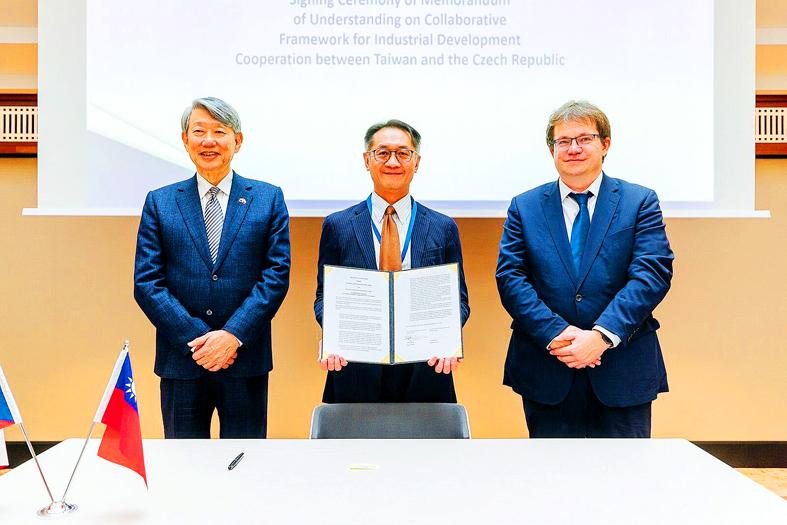Minister of Economic Affairs J.W. Kuo (郭智輝) returned to Taiwan yesterday following a trip to Germany and the Czech Republic to promote industrial cooperation, the Ministry of Economic Affairs said.
In a statement, the International Trade Administration (ITA) under the ministry said Kuo attended the inauguration of the Taiwan Trade and Investment Center in Prague on Thursday.
He also witnessed the signing of a memorandum of understanding (MOU) pledging to set up industrial clusters and promote business opportunities — in order to boost collaboration between Taiwan and the Czech Republic.

Photo courtesy of the Ministry of Economic Affairs via CNA
The MOU was signed by Representative to the Czech Republic Ke Liang-ruey (柯良叡) and Czech Economic and Cultural Office in Taipei representative David Steinke, according to the ITA.
The statement noted that the trade and investment center in Prague would be Taiwan’s first overseas investment service hub.
Under the MOU signed on Thursday, the center would enable Taiwan and the Czech Republic to collaborate in providing one-stop services for Taiwanese investors seeking opportunities in the European country.
The ITA added that the Czech Republic has a geographic advantage in Europe, a large pool of tech talent, prestigious research institutions, a sound industrial foundation and solid technological strength.
The European country has strong support from its government in technology development. This has led to it becoming one of Taiwan’s key European partners in terms of industrial cooperation, the ITA said.
Taipei would use Prague as a hub to seek other business opportunities in the European market, the ITA added.
During his stay in the Czech Republic, Kuo also met with Czech Senate President Milos Vystrcil, Marek Benda, who is a member of the Czech Chamber of Deputies and chairperson of the body’s Taiwan friendship group, as well as other Czech government officials to discuss bilateral economic exchanges, the ITA said.
Kuo’s visit to Prague was part of his trip to Germany and the Czech Republic on Wednesday and Thursday.
Before Kuo visited the Czech Republic, he went to Dresden in the German state of Saxony. Taiwan Semiconductor Manufacturing Co started constructing a new 12-inch wafer fab in the city in August, through a joint venture called European Semiconductor Manufacturing Co.
The Dresden plant is scheduled to launch mass production at the end of 2027, focusing on automotive and industrial applications.
Kuo also met with Dresden Mayor Dirk Hilbert and the Saxony Minister-President Michael Kretschmer to gain a better understanding of the investment environment. He called for the Saxony authorities to assist Taiwanese entrepreneurs where necessary.
According to the ITA, Taiwan has long played a critical role in global supply chains and made important contributions to a wide range of tech development.
That, along with Taiwanese semiconductor suppliers extending their global reach, means that many related small and medium-sized Taiwanese businesses are setting their sights on the European market.

Taiwanese can file complaints with the Tourism Administration to report travel agencies if their activities caused termination of a person’s citizenship, Mainland Affairs Council Minister Chiu Chui-cheng (邱垂正) said yesterday, after a podcaster highlighted a case in which a person’s citizenship was canceled for receiving a single-use Chinese passport to enter Russia. The council is aware of incidents in which people who signed up through Chinese travel agencies for tours of Russia were told they could obtain Russian visas and fast-track border clearance, Chiu told reporters on the sidelines of an event in Taipei. However, the travel agencies actually applied

New measures aimed at making Taiwan more attractive to foreign professionals came into effect this month, the National Development Council said yesterday. Among the changes, international students at Taiwanese universities would be able to work in Taiwan without a work permit in the two years after they graduate, explainer materials provided by the council said. In addition, foreign nationals who graduated from one of the world’s top 200 universities within the past five years can also apply for a two-year open work permit. Previously, those graduates would have needed to apply for a work permit using point-based criteria or have a Taiwanese company

The Shilin District Prosecutors’ Office yesterday indicted two Taiwanese and issued a wanted notice for Pete Liu (劉作虎), founder of Shenzhen-based smartphone manufacturer OnePlus Technology Co (萬普拉斯科技), for allegedly contravening the Act Governing Relations Between the People of the Taiwan Area and the Mainland Area (臺灣地區與大陸地區人民關係條例) by poaching 70 engineers in Taiwan. Liu allegedly traveled to Taiwan at the end of 2014 and met with a Taiwanese man surnamed Lin (林) to discuss establishing a mobile software research and development (R&D) team in Taiwan, prosecutors said. Without approval from the government, Lin, following Liu’s instructions, recruited more than 70 software

Chinese spouse and influencer Guan Guan’s (關關) residency permit has been revoked for repeatedly posting pro-China videos that threaten national security, the National Immigration Agency confirmed today. Guan Guan has said many controversial statements in her videos posted to Douyin (抖音), including “the red flag will soon be painted all over Taiwan” and “Taiwan is an inseparable part of China,” and expressing hope for expedited reunification. The agency last year received multiple reports alleging that Guan Guan had advocated for armed reunification. After verifying the reports, the agency last month issued a notice requiring her to appear and explain her actions. Guan